
What is DEBATE?
Is it a“quarrel” or logical thinking?
Gift of the gab or argumentation?
“He said she said” or a truth that is not dead?
The ancient Greek philosopher Socrates was particularly fond of debate, and often argued with others wherever he went, debating a variety of topics. He has a storied place in the history for his outstanding eloquence, leaving behind many speculative classic literary works. Amid the spiritual atmosphere inundated with free thinking, Socrates developed his own philosophical views which have been the birthplace of modern philosophical thought.
In an age slightly later than Socrates’ in China, Zhuang Zhou’s (commonly known as Zhuangzi) eloquence was also documented. Unlike the ancient Greek debaters who focused on moral, ethical, and democratic discussions, Chinese philosophers were accustomed to getting connections and observed results from man and nature. In a debate, “You are not a fish; from who do you know the joy of fish?” on the bridge of the River Hao, future generations are allowed to pry into the thinking and philosophical notions about the “I” and “otherness” in the daily life of the ancients.
From two thousand years ago till now, the tradition of debate, in both China and the West, has been kept alive, no matter how the times change. In each era, history and people would visualise the characteristics specific to those days, from ordinary people’s daily life to, in a broader sense, social reality, family and country sufferings, economic development, and political changes. Without speculative activities, it is impossible for us to step out of the constraint of perspective and the bewilderment of thinking. Debate gives us the ability to reach the limit of human spiritual exploration that communication is capable to carry.
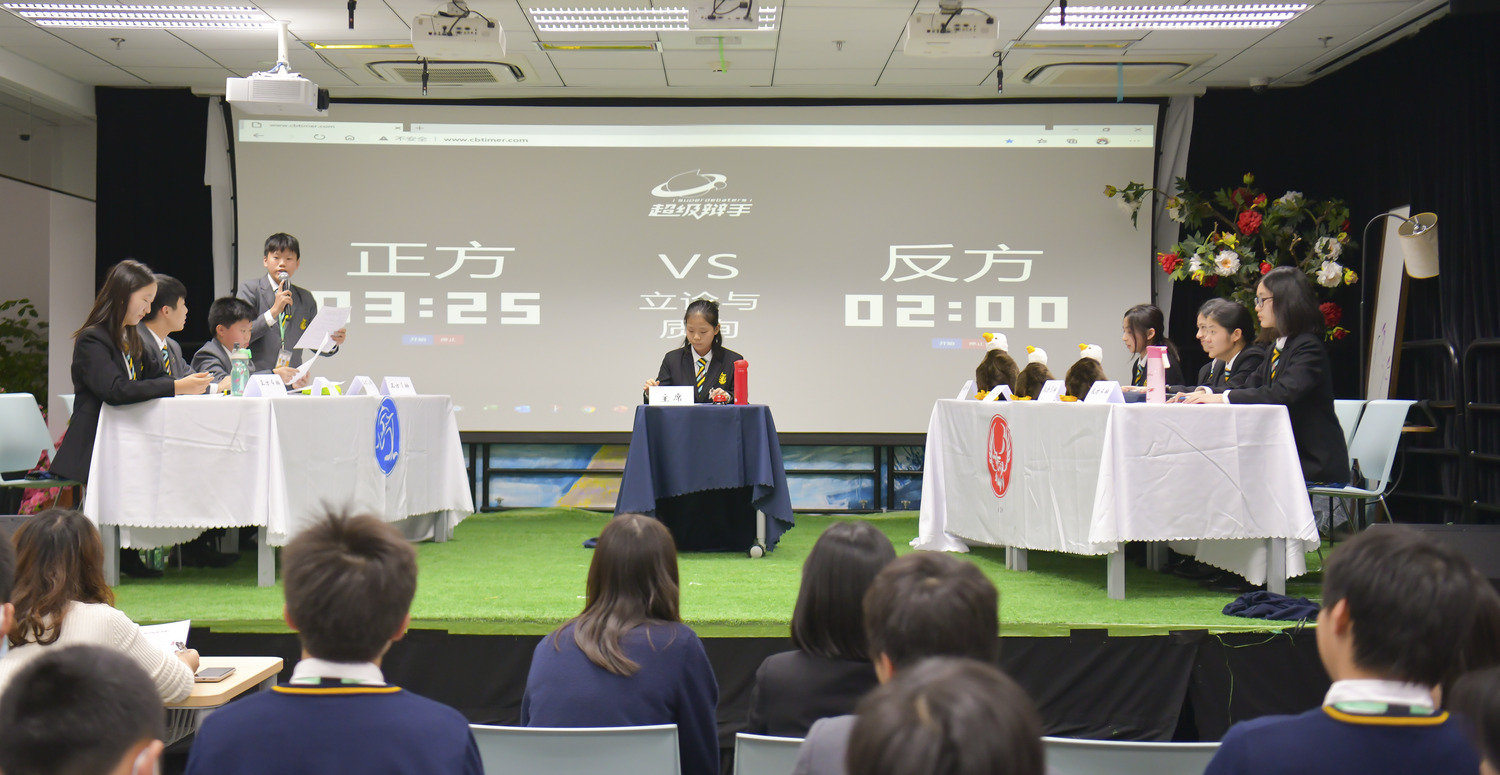
In the long arc of humans’ free thinking, Huili pupils also contribute their own unique imaginative power. Although they are still Junior High pupils, the courage and talents of the debaters enable them not to get cold feet in the face senior high school opponents. Instead, they rise to the challenge and aim high. While our debate team was only established last year, they have already set the scene earlier by accumulating the experience of debate in the Chinese-language class, thus leading up to their enjoyment and love for debate.
At the “Chenhui Cup” Chinese Debate Invitational Tournament for high school students held in Shanghai this year, the Huili team was the only one comprising of junior high school students. Nonetheless, our debaters’ courage and talents allowed them not to flinch when facing their senior high school rivals. Conversely, there was a very different story – our pupils performed exceptionally to gain a victory in the semi-finals and advanced to the finals at the end of June.
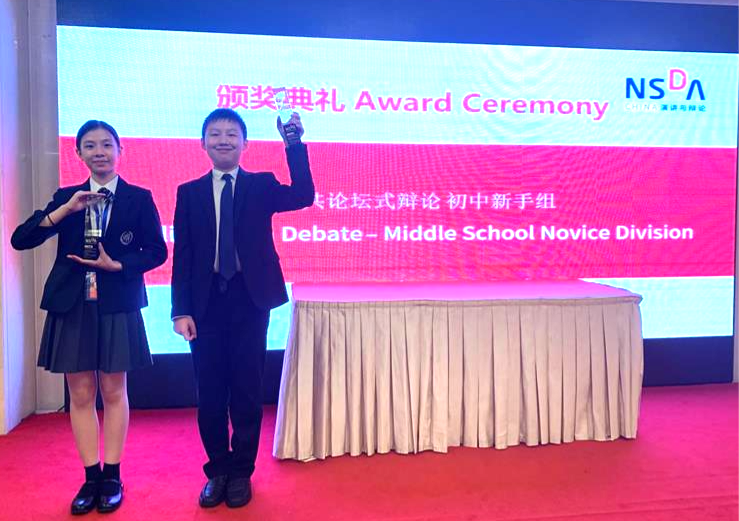
“Debating allows us to learn a lot about topical issues concerning the world right now: for example, the COVID-19 or bilateral diplomatic ties between China and Europe. Debating incentivises and awards critical thinking by allowing us to think outside the box and by allowing us to stand for both PRO and CON. Critical thinking also allows us to challenge ourselves for new adventures and dilemmas that may come in the future. In addition, debating makes us develop our speech ability, or our ability to project with fluency, conviction, and confidence. It also allows us to see the world by exposing ourselves to other worthy debaters. Lastly, winning and being victorious will be an absolutely fantastic experience. ”
—Robert (On the right side)
Champion of NSDA’s National Speech and Debate Tournament for Middle School Novice Division
Pro and con
A deep understanding of the world from multiple angles
Undoubtedly, debate is more than just the output of eloquence. What is related to the purport is people’s logical thinking and critical thinking. How do debaters gain logical thinking and critical thinking in the debate?
We try to choose a side from each of the following debates and then organise our arguments:
“Should we resurrect extinct animals?”
“Does mankind grow greater or smaller as technology increasingly grows?”
“Will we be destroyed by what we love or what we hate?”
“Should there be an ornamental zoo in today's society?”
“Should a company’s largest shareholder decide who can run the company?”
“Should the country eliminate nuclear weapons?”
“If the last of the eighty-one adversities is to ask a Tang Monk to eat meat, should he do that?”
After reading these debate topics, many people may have a feeling of “boggling their mind”. These topics are as exercises in class offered by Huili for its CCA sessions, or examples of interesting topics that the members of Huili’s debate team have met in debate competitions. Debate can arguably be the extension of their thinking about the world. In debate classes and mock debates, the teacher will carefully analyse the debate topics from both sides, and pupils will repeatedly think about scientific and technological development, political and economic issues closely related to social reality in the process of constant position establishments, overturns and reconstructions.
In the deconstruction of some issue-based debate topics, such as resurrecting extinct animals and Tang monk eating meat, debaters can also offer an opportunity to maximise their imagination and ability of thinking.
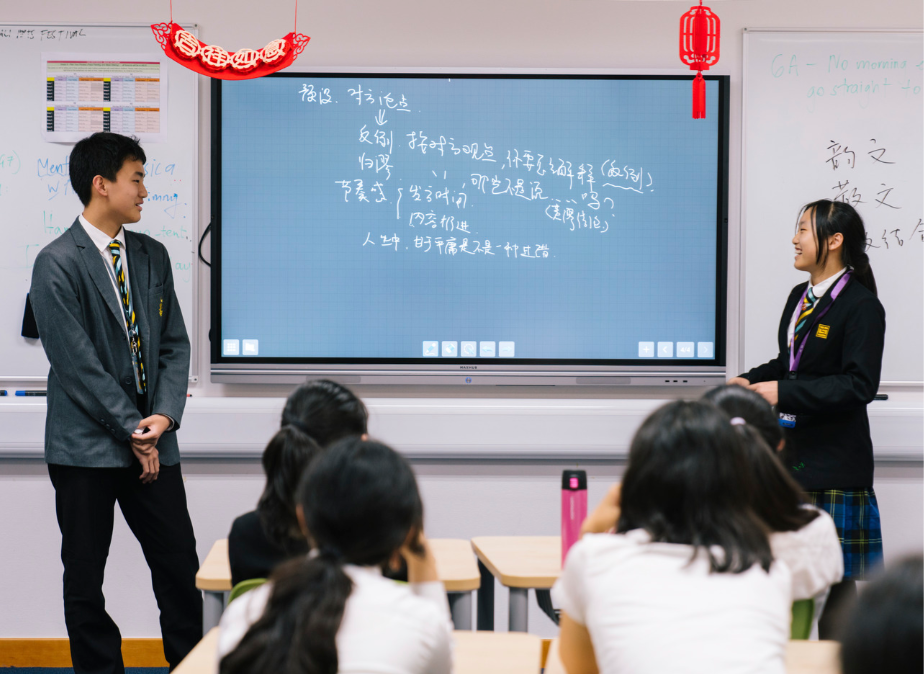
In academic training and analog practices, pupils can have a broad and profound understanding of society and the world, which in turn enhances their academic performance in class. The debate empowers a wide-ranging perspective on the world. Understanding different countries, historical civilizations, economic characteristics, developmental patterns of science and technology, financial systems and international relations is an indispensable preparation for debaters prior to any debate.
Such an understanding is considered as a relatively rough-and-ready analysis. During the constant argumentation and the refutation of the other side, the debater will make the main contentions of their side clearer and clearer, and recite more cogent facts to support his arguments.

The debate on the hot topics in society such as surrogacy allows the debater to look at this matter standing at the points of moralism and liberalism, while the debate on issue-based topics, such as the analysis of “Tang Monk eating meat”, enables them to carry out metaphysical philosophical reflection on religion and social reality, what is a true religious belief, and other issues.
As for free thinking and free expression related to morals, politics, and ethics, the debater has an opportunity to have clear-eyed insights into the diversity of things, understand the complexity of the world, and question the rationality of existing facts. It is safe to say that today’s debate remains an inheritance of the spirits of ancient Greek philosophy and freedom, whether it is from the breadth of knowing the world or the depth of understanding things.
Chinese and speculation
From expanded Chinese taught in Junior High to IB Chinese academic research
What is “Chinese”?
In the Chinese teaching at Huili’s Junior High, we have always adhered to the teaching philosophy of ‘expanded Chinese’, that is, the learning of Chinese is a coherent process from learning language to learning text content and finally thought. It can be said that the philosophy of ‘expanded language’ is to set the objectives of learning Chinese at cultural and thinking dimensions.
Therefore, we not only pay attention to pupils’ solid accumulation of knowledge on the basis of Chinese, but also emphasise the multi-dimensional presentation of the same topic, so as to enhance their speculative thinking, as well as their ability to analyse and demonstrate problems. The cultivation of critical thinking skills in the Chinese class propels debate to be one of the important teaching methods in the Chinese class for Junior High pupils. Debate brings a multi-dimensional presentation of the same topic, so that pupils are well positioned to have a deeper understanding of the meaning of the text and literature.
In the Chinese debate class in Grade 7, in combination with the study of The Analects of Confucius, pupils will face such debates: Is Confucius a saint? Is The Analects of Confucius a holy book? At the same time, they also have to find and analyse debate topics based on The Analects of Confucius. For example, Confucius’ saying that, "When I was thirty I established myself in society according to the manners, when I was forty I was no longer vexed by earthly affairs, when I was fifty I knew what was pre-decided by fate was not within my reach, and when I was sixty I was able to accept opinions of various kinds,” pointing out that people at different ages should have missions and characteristics at different stages. So, “what things have to be done at a certain age?”
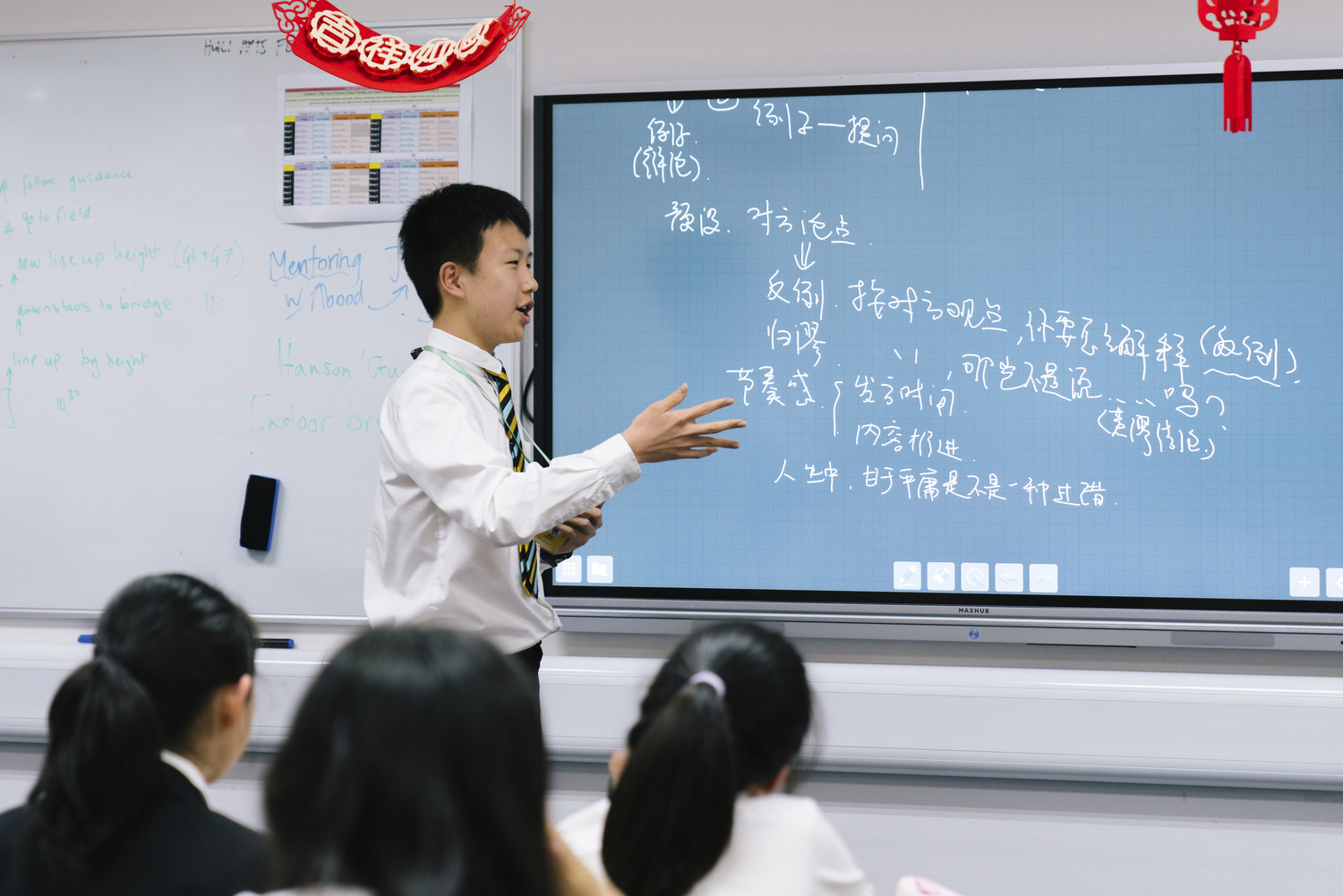
Different from simply learning knowledge from a textbook, reverse thinking of or even questioning the literary classics that we once considered to be “the most famous sayings” allows pupils to have the opportunity to reflect on today’s living environment and the characteristics of the times from the academic background of Confucianism. This is what it looks like for the training and cultivation of pupils’ critical thinking skills. The critical thinking skills trained in the Chinese debate class is not only reflected in the debate itself, but also can be penetrated into the writing of argumentative essays.
Proposition, refutation and questioning in the debate are examples of progressive analysis of the topics. Debaters need to present their standpoints and arguments in different debate parts in the form of writing argumentative essays prior to a debate. This practice of putting logical thinking into writing makes pupils have more organised and logical expression in Chinese writing.
The purpose of the cultivation of critical thinking skills in Chinese writing is to smoothly link up with the teaching setting of the Chinese course in the IBDP curriculum system that Huili will adopt in the high school.
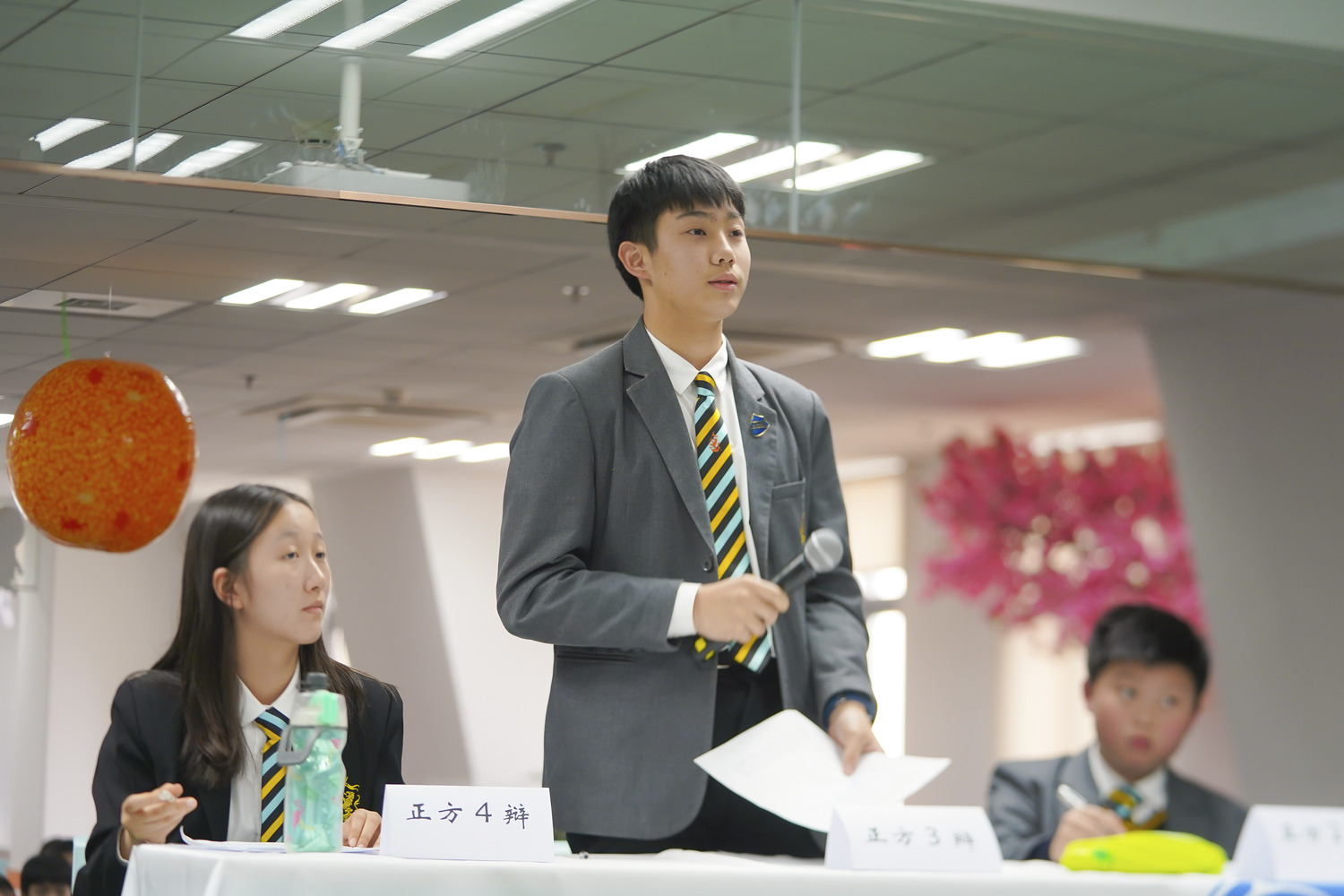
The IBDP Chinese course provides more free space for teaching, while at the same time puts forward higher requirements for pupils. In IBDP Chinese class, classroom reports and academic essay writing are key content of examination, but there are no standard answers in the usual sense for these examinations. This requires pupils to actively discover problems in their daily learning and try to analyse and solve them to develop their own perspective and logic. Only in doing so, can their academic research capabilities be demonstrated. The debates in the Chinese class in Junior High School are instrumental to long-term thinking training and the cultivation of academic ability.
Free thinking
“He said she said” is to achieve a mutually inclusive understanding
In an extremely tense debate, both sides insist on their own words, an atmosphere which, it is fair to say, can be described as powerful and ready to fight. The rules of the game make winning look very important, because the "winner" is about honour, and sometimes it is also a representative of “the stronger”. However, even on the debate field, there are no rivals who always stand on the opposite. A good rival is like a mirror, which helps someone see their own shortcomings to improve himself.
Just as the debating etiquette is emphasised in the debate, the confrontation of views is not to create an either-or opposition, but to allow the debater to learn to listen to their teammates and the other side, and adjust, change and integrate. Debating etiquette can help the debaters cool down in the red-hot atmosphere, restrain emotions, think rationally, and replace aggressiveness with persuasiveness. This is not only a respect for opponents, but also helps keep calm and rational thinking in the process.
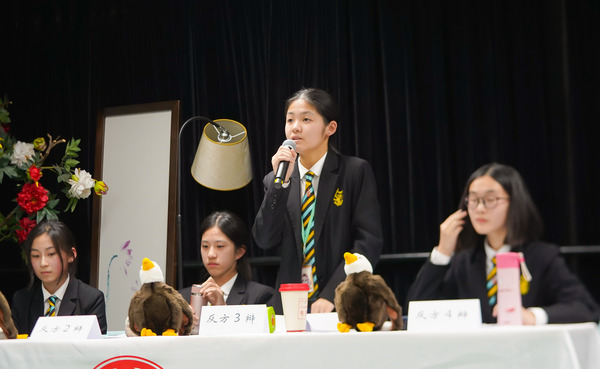
From a broader perspective, in fact, in the free spirit of debate, there is no longer “win or defeat” and “rival”. There is no absolutely correct truth around the world. Even in the debates in ancient Greece, the philosophers never declared the truth, and just demonstrated their conclusions to others. Therefore, in the debate, the existence of views is not to emphasise the correctness of themselves, but the freedom of thinking.
Restricted thinking makes each side of the debate insist on their own words and never see the other side’s position. Self-righteousness is the origin of conflict. In contrast, as for free thinking, even if we insist on each other in the field, we will eventually reach a mutual inclusive understanding, bathing in the free spirit of debate. Debate is to create a more harmonious and inclusive world. Today when conflicts and confrontations are still frequent, whether it is development in both the East and the West or regional wars, they all make us reflect on how to work hard to create a better world.
We need to inherit the spirit of free debate from ancient Greek philosophy to help us reach an understanding and reduce conflicts and confrontations in the free exchange and thinking of views. We should seek cooperation between human beings and shared growth in the future development, and avoid political and cultural conflicts due to resolute opposition, which have already caused the sacrifice of numerous innocent lives.
Written by Virginia